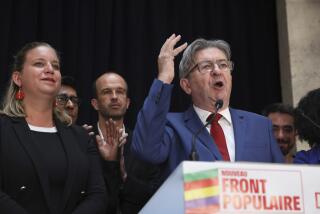Ex-Guerrillas Make Strong Showing in Salvador Vote
SAN SALVADOR — The ex-guerrillas of the Farabundo Marti National Liberation Front proved that they have transformed their battle skills into campaign skills as electoral results announced Monday showed the leftists with more seats in the Legislative Assembly and control of more provincial capitals than any other single party.
Now, analysts say, they will have to demonstrate their political skills in a congress that also includes two right-wing parties that traditionally are allied with each other.
The left’s agility will help determine whether Salvadorans see the former guerrillas as a viable alternative to govern the country and the ballot box as a viable place to express differences that until eight years ago were being disputed on the battlefield.
“The FMLN will have to prove its ability to negotiate and its capacity to be a loyal opposition,” said political columnist Roberto Turcios, referring to the Front.
Sunday’s elections mark the first time in 11 years that President Francisco Flores’ far-right Nationalist Republican Alliance, or Arena, has not controlled both the legislative and executive branches of government.
Arena has 29 of the 84 seats in the assembly. Even a coalition with the National Conciliation Party--the old military party that won 14 seats--will leave Arena with a bare majority and far short of the two-thirds vote needed to pass many measures.
The FMLN won 31 assembly seats. Furthermore, it will have bully pulpits in 78 of El Salvador’s 262 increasingly independent city halls. That includes eight of the 14 provincial capitals. Hector Silva, the Front’s candidate, was elected to a second three-year term as mayor of San Salvador.
The strong electoral showing also brings challenges, Turcios warned. “There is still a fear of the FMLN, an excessive worry among some members of Arena, almost anguish, that distorts the political process,” he said.
Among those most worried are owners of large businesses, who have confronted Silva over city taxes and the FMLN leadership over proposals to regulate profits and interest rates and halt sales of government-owned companies.
“We will not allow private enterprise to be cornered,” said Juan Hector Vidal, consultant to the National Private Enterprise Assn., which represents major businesses. “They cannot govern without private enterprise. Their position of permanent confrontation has led us to distrust them.”
FMLN leaders insist that these elections prove that such concerns have been largely dispelled. “The citizenry has overcome its fear and prejudices,” said Schafik Handal, leader of the FMLN delegation in the assembly. A former commander in the Marxist guerrilla movement that fought the government for 12 years, Handal is considered a leader of the most radical faction of the FMLN.
He acknowledged that, with 31 of the 84 seats in the congress, the FMLN will have to reach compromise agreements in order to legislate.
That will require considerable skill, especially because the smaller parties that often have voted with the former insurgents suffered resounding defeats in the election.
More to Read
Sign up for Essential California
The most important California stories and recommendations in your inbox every morning.
You may occasionally receive promotional content from the Los Angeles Times.










